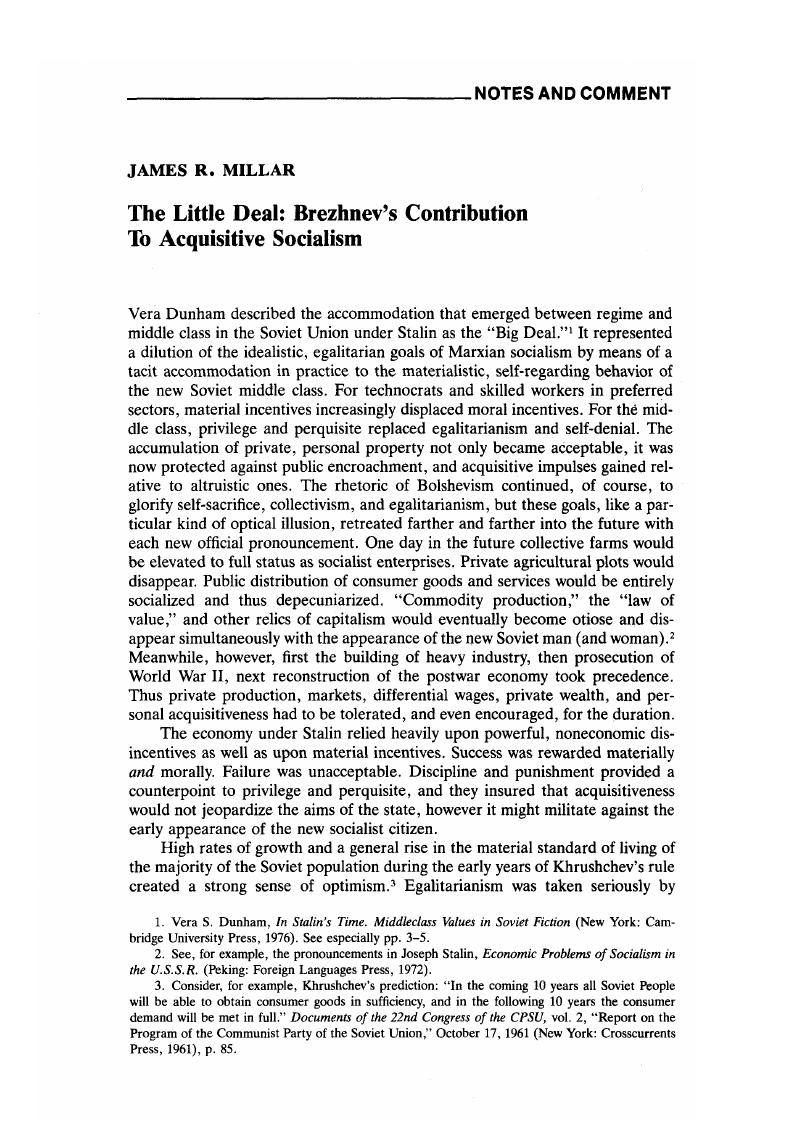Article contents
The Little Deal: Brezhnev's Contribution To Acquisitive Socialism
Published online by Cambridge University Press: 27 January 2017
Abstract

- Type
- Notes and Comment
- Information
- Copyright
- Copyright © Association for Slavic, East European, and Eurasian Studies. 1985
References
1. Dunham, Vera S., In Stalin's Time. Middleclass Values in Soviet Fiction (New York: Cambridge University Press, 1976)Google Scholar. See especially pp. 3–5.
2. See, for example, the pronouncements in Stalin, Joseph, Economic Problems of Socialism inthe U.S.S.R. (Peking: Foreign Languages Press, 1972)Google Scholar.
3. Consider, for example, Khrushchev's prediction: “In the coming 10 years all Soviet Peoplewill be able to obtain consumer goods in sufficiency, and in the following 10 years the consumerdemand will be met in full.” Documents of the 22nd Congress of the CPSU, vol. 2, “Report on theProgram of the Communist Party of the Soviet Union,” October 17, 1961 (New York: CrosscurrentsPress, 1961), p. 85.
4. See McAuley, Alastair, Economic Welfare in the Soviet Union: Poverty, Living Standards, andInequality (Madison: University of Wisconsin Press, 1979)Google Scholar; Michael Ellman, “A Note on the Distributionof Earning in the USSR under Brezhnev,” Slavic Review, 39, no. 4 (December 1980); BasileKerblay, “Social Inequality in the USSR,” Problems of Communism (January-February 1982); Nove, Alec, An Economic History of the USSR (New York: Penguin Books, 1982), especially pp. 347–49Google Scholar.
5. Statement of the Honorable Henry Rowen, Chairman, National Intelligence Council, CIA,Before the Joint Economic Committee, Congress of the United States, December 1, 1982 (mimeo),pp. 5–6.
6. For a discussion, see Millar, James R., The ABCs of Soviet Socialism (Urbana: University of Illinois Press, 1981), especially pp. 182–87.Google Scholar
7. The magnitude and burden of military expenditures remains a matter of dispute. See, forexample, Franklin D. Holzman, The Soviet Economy. Past, Present and Future, published in theHeadline Series by the Foreign Policy Association, no. 260 (September/October 1982), pp. 28–31.
8. Sources as in n. 6, and preliminary findings of the Soviet Interview Project.
9. Alec Nove, An Economic History, p. 368.
10. See, for example, Boulding, Kenneth E., Economic Analysis, 3rd ed. (New York: Harper & Brothers, 1955)Google Scholar, chap. 37.
11. Ofer, Gur, The Service Sector in Soviet Economic Growth. A Comparative Study (Cambridge:Harvard University Press, 1973)Google Scholar.
12. For a good, concise description see Gregory Grossman, “The Second Economy of theUSSR,” Problems of Communism (September-October 1977).
13. See, for example, Karl Polanw(%£ 6e1x Transformation (Boston, Mass.: Beacon Press,1957), especially chap. 4.
- 40
- Cited by


